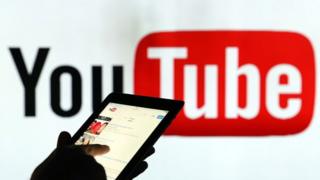 Image copyright
Image copyright
Getty
YouTube has banned coronavirus-related content that does not follow the World Health Organization’s guidelines
YouTube has banned any coronavirus-related content that directly contradicts World Health Organization (WHO) advice.
The Google-owned service says it will remove anything it deems “medically unsubstantiated”.
Chief executive Susan Wojcicki said the media giant wanted to stamp out “misinformation on the platform”.
The move follows YouTube banning conspiracy theories falsely linking Covid-19 to 5G networks.
Mrs Wojcicki made the remarks on Wednesday during her first interview since the global coronavirus lockdown began.
“So people saying, ‘Take vitamin C, take turmeric, we’ll cure you,’ those are the examples of things that would be a violation of our policy,” she told CNN.
“Anything that would go against World Health Organization recommendations would be a violation of our policy.”
Mrs Wojcicki added YouTube had seen a 75% increase in demand for news from “authoritative” sources.
Last week, Facebook announced users who had read, watched or shared false Covid-19 information would receive a pop-up alert urging them to visit the WHO’s website.
Facebook-owned messaging service WhatsApp, meanwhile, stopped users forwarding messages already shared more than four times by the wider community to more than one chat at a time.
The culture secretary praised the response from social media and technology companies in banning misinformation about coronavirus.
“I pay tribute to the work they have done,” Oliver Dowden told the Digital, Culture, Media and Sport Select Committee on Wednesday.
But he urged them to take down inaccurate information faster during “out of hours” periods such as evenings and weekends.
Human interest
It comes as some of the UK’s largest news publishers, including Daily Telegraph and the Guardian, criticised Google for failing to be transparent about its approach to filtering adverts alongside coronavirus-related content, according to the Financial Times.
Brands are using blacklist filters to prevent their ads running alongside stories including keywords such as “coronavirus” and “pandemic”.
Such filters are already widely used, to avoid car manufacturers’ ads appearing next to stories about road accidents, for example.
But now some media outlets are reportedly frustrated content they deem “inoffensive,” such as uplifting human interest stories, are also being prevented from running these adverts.
It is estimated keyword ad-blocking could cost the UK newspaper industry $50m (£40m) over the next year.
And Digital Minister John Whittingdale discussed the issue with publishers and advertising agencies earlier this month.
Google told the Financial Times it was “in constant discussions regarding how it can help the industry during this difficult time”.





More Stories
What Makes Genuine Canon Ink Cartridges A Great Buy?
Computer Futures – Right Strategy to Let You Know Cloud Computing Technology
How Can I Watch Satellite TV On My Computer